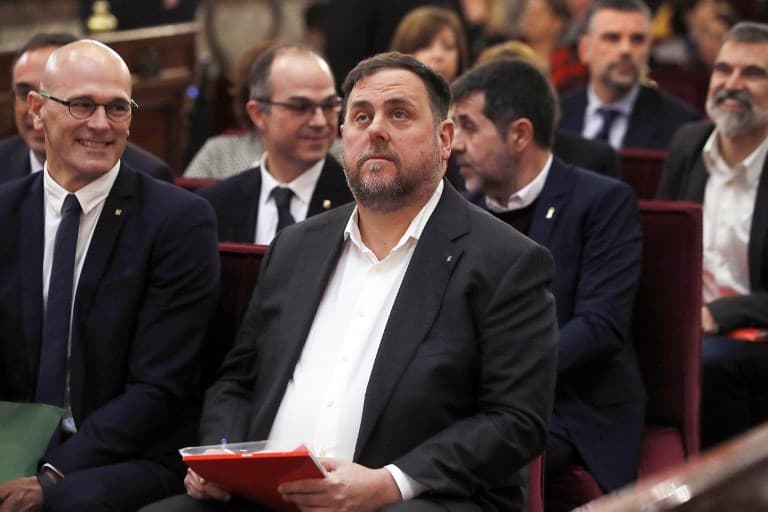Oriol Junqueras refuses to answer prosecutor during Catalan separatists' trial

The lead defendant in the trial of 12 Catalan separatist leaders, former regional vice president Oriol Junqueras, refused to answer prosecutors' questions in court on Thursday.
"I am being persecuted for my ideas and not for my actions... I will not answer questions from the accusers," he said as he took the stand in Spain's Supreme Court in Madrid for the first time.
Junqueras faces 25 years behind bars if he is convicted of rebellion and misuse of public funds for pushing an independence referendum in October 2017 in defiance of a court ban.
The referendum was followed by a declaration of independence by leaders in the northeastern region, which sparked Spain's worst political crisis in decades.
"I consider myself to be a political prisoner," said Junqueras, in response to questions from his own lawyer.
READ MORE: Catalan separarists' trial: What you need to know
Junqueras has been held in pre-trial detention for more than a year.
"Nothing which we did is a crime, nothing, absolutely nothing. Voting in a referendum is not a crime. Working peacefully for independence is not a crime. We have not committed a single one of the crimes we are accused of," he added.
The 11 other accused in the politically charged trial which got underway on Tuesday include members of Catalonia's former executive, the two leaders of the powerful pro-independence associations ANC and Omnium Cultural, and the former president of the Catalan parliament. They face jail terms of seven to
17 years.
In total, nine defendants have been charged with rebellion. They have all been in pre-trial detention for months, some of them for more than a year. The three others are accused of disobedience and misuse of public funds.
Under Spanish law, rebellion is defined as "rising up in a violent and public manner". But the key question is whether there actually was any violence.
Prosecutors point to "violent incidents" during protests orchestrated by two grassroots groups in the lead-up to the referendum.
Activists surrounded a Catalan economy ministry building on September 20, 2017 while national police carried out a search inside to try to stop the vote from going ahead.
The defendants deny that the referendum drive was carried out in a violent manner. They point to violence by police who raided voting stations on the day of the referendum.
Carles Puigdemont, Catalonia's former president who fled Spain days after the independence declaration on October 27, is not among the defendants.
Spain does not try suspects in absentia for major offences.
READ ALSO: Will Pedro Sanchez be forced to call early elections?
Comments
See Also
"I am being persecuted for my ideas and not for my actions... I will not answer questions from the accusers," he said as he took the stand in Spain's Supreme Court in Madrid for the first time.
Junqueras faces 25 years behind bars if he is convicted of rebellion and misuse of public funds for pushing an independence referendum in October 2017 in defiance of a court ban.
The referendum was followed by a declaration of independence by leaders in the northeastern region, which sparked Spain's worst political crisis in decades.
"I consider myself to be a political prisoner," said Junqueras, in response to questions from his own lawyer.
READ MORE: Catalan separarists' trial: What you need to know
Junqueras has been held in pre-trial detention for more than a year.
"Nothing which we did is a crime, nothing, absolutely nothing. Voting in a referendum is not a crime. Working peacefully for independence is not a crime. We have not committed a single one of the crimes we are accused of," he added.
The 11 other accused in the politically charged trial which got underway on Tuesday include members of Catalonia's former executive, the two leaders of the powerful pro-independence associations ANC and Omnium Cultural, and the former president of the Catalan parliament. They face jail terms of seven to
17 years.
In total, nine defendants have been charged with rebellion. They have all been in pre-trial detention for months, some of them for more than a year. The three others are accused of disobedience and misuse of public funds.
Under Spanish law, rebellion is defined as "rising up in a violent and public manner". But the key question is whether there actually was any violence.
Prosecutors point to "violent incidents" during protests orchestrated by two grassroots groups in the lead-up to the referendum.
Activists surrounded a Catalan economy ministry building on September 20, 2017 while national police carried out a search inside to try to stop the vote from going ahead.
The defendants deny that the referendum drive was carried out in a violent manner. They point to violence by police who raided voting stations on the day of the referendum.
Carles Puigdemont, Catalonia's former president who fled Spain days after the independence declaration on October 27, is not among the defendants.
Spain does not try suspects in absentia for major offences.
READ ALSO: Will Pedro Sanchez be forced to call early elections?
Join the conversation in our comments section below. Share your own views and experience and if you have a question or suggestion for our journalists then email us at [email protected].
Please keep comments civil, constructive and on topic – and make sure to read our terms of use before getting involved.
Please log in here to leave a comment.